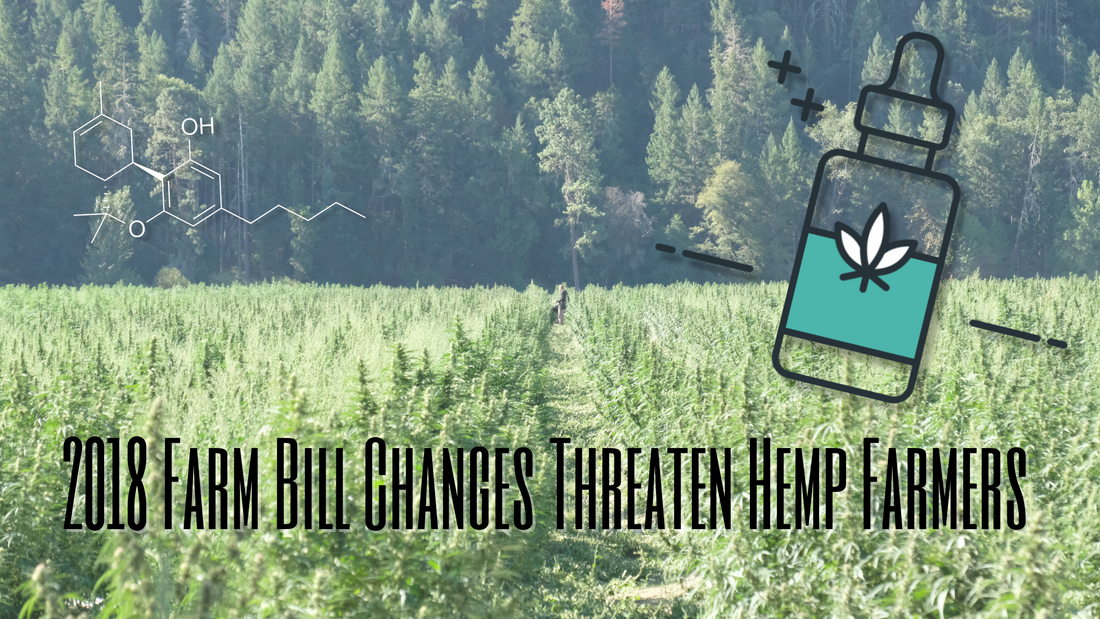
Farm Bill Changes Could Spell Disaster for CBD and D8
Share

The Ninth Circuit Court of Appeals protected the rights of Hemp farmers across the country late last month, but concerns over an impending language change for the 2023 Farm Bill ripple through the industry.
Silence from the federal government worked in the favor of the hemp industry for once, but CBD, delta-8 THC and all these other new hemp-derived products could still face turmoil, and sooner than you might think. Two California-based cannabis companies are at each other’s necks in court over a trademark dispute that perfectly illustrates just how confusing and potentially harmful cannabis laws can be to the industry they are trying to regulate.
The version of the Farm Bill passed in 2018 offered many boons to a struggling agricultural market, not the least of which being the legalization of cannabis products country-wide. The caveat was simply that these products had to contain less than 0.3% delta-9 THC. Since the Farm Bill of 2018 went into effect, the alternative cannabinoid industry has taken root and is growing into a promising market, even in states where cannabis is legal. The issue is that the federal government still considers synthesized THC compounds to be illegal, putting current and pre-existing laws at odds and creating the perfect breeding ground for issues like the one that was just addressed by the 9th Circuit Court.
AK FUTURES V. BOYD STREET DISTRO
California-based cannabis company, AK Futures, filed a copyright dispute against Boyd Street Distro way back in June of 2021 over the replication by the latter of multiple AK Futures “CAKE” products, registered through the U.S. Copyright Office. The district court that saw the initial lawsuit ruled in favor of AK Futures, prompting a retaliation on the part of Boyd Street Distro. According to the lawsuit, Boyd Street Distro did not argue against the claims that they were manufacturing and distributing counterfeit “CAKE” delta-8 THC products. Instead, they argued that the trademark itself was unlawful, according to federal legislation, thus negating the ruling of the district court.
The Ninth Circuit Court of Appeals followed suit with the district court, noting that the “plain and unambiguous” wording of the 2018 Farm Bill provides ample grounds for the legality of delta-8 products and other alternative cannabinoids with lower than 0.3% delta-9 THC. Boyd Street Distro was cut down in both courts, which bodes well for future copyright issues and legality questions. But, it also illustrates a major concern of the hemp industry.
THE REAL PROBLEM
Alternative cannabinoids offer access to aspects of the cannabis plant that were previously unknown to those outside of states where the plant is legal. They were weaker versions of their delta-9 THC counterpart, but it was a step in the right direction when it came to widespread legalization. This newfound market is exciting, and big money is flowing through both startups and veteran cannabis companies nationwide. But it all relies on the Farm Bill, and the 2018 version is going to reach its limit come 2023. When this new Farm Bill finally passes and takes effect, will the wording that worked in favor of the hemp industry stay the same? It is safe to say that the money being generated by the hemp industry will certainly reflect positively for future legislation, but misinformation and bullheaded aversion to the truth threaten to initiate a revision of the law that will not view alternative cannabinoids so kindly.
Currently, the Farm Bill states that it is legal to make cannabis products as long as they contain 0.3% delta-9 THC. Specifically, the law says that “all derivatives, extracts, [and] cannabinoids” are subject to this legalization, given they follow the guidelines. However, this edition of the Farm Bill does not last forever. The bill is set to expire in 2023, bowing out in favor of a newer version. Now, hemp companies have change looming on the horizon.
With the alternative cannabinoid industry so hot at the moment, and with the amount of money it is bringing in, it seems unlikely that legislators will opt to completely restrict the sale and production of delta-8 THC. However, they could choose to clarify the language, thus limiting the way cannabinoids can be processed. Simply designating the type of cannabis that can be used in the extraction process could severely impede a huge portion of current hemp companies, as many of them are exploiting the loophole in the 2018 Farm Bill, allowing the use of high-THC variants – or “hot hemp” – in the manufacturing process, as long as the final product contains no more than 0.3% delta-9 THC.
AK Futures may have won out against Boyd Street Distro when it comes to cannabis copyright, but this lawsuit also revealed a major problem on the horizon. Only time will tell whether the 2023 Farm Bill will be as kind to the hemp industry as its predecessor.
